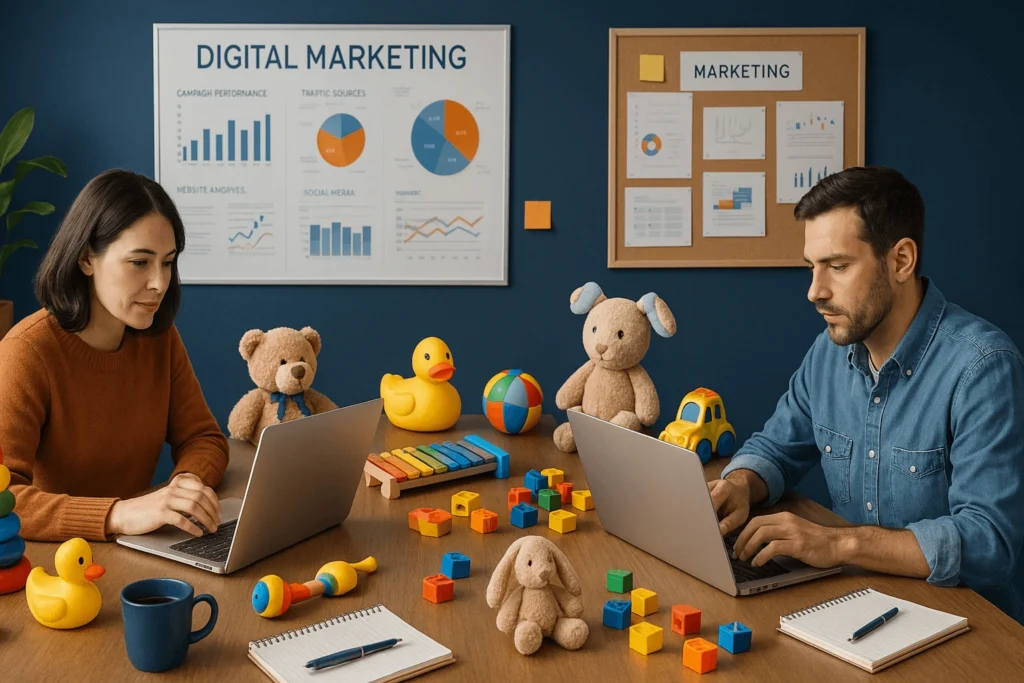The digital marketing landscape has evolved dramatically over the past five years. What once required massive in-house teams or expensive agency retainers can now be executed more efficiently through a hybrid approach that combines human expertise with AI-powered workflows. Enter the talent assistant model a game-changing approach that’s reshaping how brands execute their marketing strategies.
If you’re a business owner, marketing director, or agency leader feeling overwhelmed by the complexity of modern digital marketing, you’re not alone. The solution isn’t hiring more full-time employees or paying premium agency fees. It’s leveraging talent assistants who can deliver specialized marketing execution at scale.
Table of Contents
What Is a Talent Assistant in a Digital Marketing Agency?
A talent assistant in digital marketing is a skilled professional who combines strategic thinking with hands-on execution, supported by modern tools and proven processes. Unlike traditional virtual assistants who handle administrative tasks, talent assistants are marketing specialists who can independently manage complex campaigns, create strategic content, and drive measurable results.
The key distinction lies in their approach. While virtual assistants typically follow basic instructions, talent assistants operate with marketing intelligence. They understand campaign objectives, can adapt strategies based on performance data, and proactively suggest optimizations. They’re not just executing tasks – they’re thinking strategically about how each action contributes to your broader marketing goals.
This matters enormously in digital marketing because today’s campaigns require both creative thinking and technical execution. A talent assistant can write compelling ad copy that converts, set up sophisticated automation sequences, analyze performance metrics, and adjust strategies in real-time. They bridge the gap between strategic oversight and tactical implementation.
The talent assistant model has emerged as the sweet spot between expensive agency partnerships and unreliable freelancer relationships. You get dedicated expertise without the overhead of full-time employees, plus the reliability and accountability that comes with working through an established platform or agency.
Ready to See How Talent Assistants Can Transform Your Marketing?
Get Started TodayWhy Modern Brands Need Talent Assistants
Digital marketing has become exponentially more complex. Today’s successful campaigns often involve coordinating content across multiple platforms, managing sophisticated email sequences, optimizing for various search algorithms, and integrating with numerous tools and systems. The days of simple “post on social media and hope for the best” marketing are long gone.
This complexity creates a time crunch for business leaders. Marketing directors find themselves spending more time managing systems and processes than developing strategy. CEOs get pulled into campaign details when they should be focusing on growth. The solution isn’t to hire more full-time staff – it’s to find skilled professionals who can handle execution while you focus on strategy and business development.
Talent assistants excel at blending creativity with automation. They can craft personalized email campaigns that feel human while leveraging automation tools for scale. They understand how to create content that performs well both with audiences and search algorithms. This hybrid approach – human creativity powered by intelligent tools – delivers results that pure automation or traditional manual approaches can’t match.
Most importantly, talent assistants are results-focused rather than hours-focused. Traditional agency models often emphasize billable hours and activity metrics. Talent assistants are measured on outcomes: increased qualified leads, improved conversion rates, higher engagement metrics, and ultimately, revenue growth. This alignment of incentives means they’re motivated to find the most efficient path to your marketing goals.
The speed advantage is also significant. While traditional agencies might take weeks to implement campaign changes, talent assistants can often execute optimizations within days or even hours. This agility is crucial in digital marketing, where algorithm changes and market conditions can shift rapidly.
Key Roles and Responsibilities of a Talent Assistant
Modern talent assistants handle a comprehensive range of marketing functions, often specializing in specific areas while maintaining broad competency across digital channels.
Content Creation and Strategy
Talent assistants develop content calendars, write blog posts, create social media content, and craft email campaigns. They understand how to adapt messaging for different platforms and audiences while maintaining brand consistency. This isn’t just writing – it’s strategic content development that supports specific business objectives.
SEO Support and Implementation
From keyword research to on-page optimization, talent assistants can handle technical SEO tasks while also creating content that ranks. They stay current with algorithm updates and can implement changes quickly to maintain or improve search visibility.
Social Media Management
Beyond posting content, talent assistants manage community engagement, analyze performance metrics, and adjust strategies based on platform-specific insights. They understand the nuances of different social platforms and can optimize content for each channel’s unique algorithm and audience behavior.
Email Marketing and Automation
This includes designing email sequences, segmenting audiences, creating automated workflows, and analyzing campaign performance. Talent assistants can build sophisticated nurture campaigns that guide prospects through your sales funnel while maintaining a personal touch.
Analytics and Reporting
Talent assistants don’t just collect data – they interpret it and provide actionable insights. They can identify which campaigns are driving the highest-quality leads, recommend budget reallocations based on performance data, and spot optimization opportunities that might be missed by less experienced team members.
CRM and Marketing Automation Support
From setting up lead scoring systems to managing customer data, talent assistants can optimize your marketing technology stack. They ensure your tools work together seamlessly and that data flows efficiently between systems.
The key advantage is integration. Rather than having separate specialists for each function, a skilled talent assistant can manage multiple areas while ensuring they work together cohesively. This integrated approach often produces better results than fragmented specialist work.
How Talent Assistants Fit into a Digital Marketing Agency Model
The talent assistant model offers three primary implementation approaches, each with distinct advantages depending on your business needs and growth stage.
In-House Model
The in-house model involves hiring talent assistants as direct employees. This provides maximum control and integration with your team culture, but requires significant overhead in recruiting, training, and management. It works best for larger companies with substantial ongoing marketing needs and the resources to support dedicated staff.
Outsourced Model
The outsourced model involves working with individual talent assistants as contractors or through freelance platforms. This offers cost savings and flexibility but can create challenges with consistency, communication, and quality control. Success depends heavily on finding the right individuals and managing them effectively.
Hybrid Model
The hybrid model represents the emerging best practice: working with talent assistant agencies that provide vetted professionals supported by proven processes and technology. This approach combines the expertise and reliability of an agency with the cost-effectiveness and flexibility of individual talent assistants.
Torplix exemplifies this hybrid approach by providing carefully selected talent assistants who are supported by standardized processes, AI-powered digital tools, and ongoing management. This model scales efficiently because the platform handles recruitment, vetting, training, and quality assurance while clients get dedicated resources focused on their specific goals.
The scalability advantage is significant. Traditional agencies often require months-long contracts and significant minimum commitments. Talent assistant agencies can typically scale resources up or down based on campaign needs, seasonal fluctuations, or budget constraints. This flexibility is particularly valuable for businesses with variable marketing demands or those testing new channels and strategies.
Benefits of Hiring Through a Talent Assistant Digital Marketing Agency
Working with a talent assistant digital marketing agency provides several key advantages over hiring individual freelancers or traditional agency partnerships.
Pre-vetted Professionals
Agency-provided talent assistants have been screened for both technical skills and cultural fit. This eliminates the time-consuming process of interviewing multiple candidates and reduces the risk of hiring someone who can’t deliver results. The vetting process typically includes portfolio reviews, skill assessments, and reference checks.
Aligned with Marketing Goals
Unlike generalist virtual assistants, talent assistants from specialized agencies understand marketing objectives and can contribute strategically to campaign success. They’re trained to think in terms of conversion rates, customer acquisition costs, and lifetime value rather than just task completion.
Faster Onboarding
Established agencies have developed streamlined onboarding processes that get talent assistants productive quickly. They understand common marketing tools, have access to proven templates and workflows, and can often begin contributing meaningfully within days rather than weeks.
Proven Playbooks and AI-Powered Workflows
The best talent assistant agencies have developed systematic approaches to common marketing challenges. Rather than starting from scratch, clients benefit from battle-tested strategies that have been refined across multiple campaigns and industries.
Accountability and Quality Assurance
Agency-backed talent assistants operate within established quality control systems. There are backup resources if someone becomes unavailable, standardized reporting formats, and escalation paths for resolving issues quickly.
Technology Integration
Leading agencies provide their talent assistants with premium digital marketing agency tools and technologies that individual freelancers might not have access to. This can include advanced analytics platforms, design software, automation tools, and AI-powered optimization systems.
The comparison is stark when you consider the alternatives. Individual freelancers might offer lower hourly rates but often require more management oversight and may lack the specialized skills needed for complex campaigns. Traditional agencies provide expertise but often at premium prices with less flexibility and longer commitment periods.
Don’t Let Marketing Complexity Hold Your Business Back
Book Free ConsultationWho Should Hire Talent Assistants?
The talent assistant model serves different business types and situations, each with specific advantages and considerations.
Startups Looking to Scale Lean
Startups benefit enormously from talent assistants because they need marketing execution without the overhead of full-time employees. Early-stage companies can access senior-level marketing skills while maintaining the flexibility to pivot strategies or adjust resources based on funding and growth milestones. The cost-effectiveness allows startups to compete with better-funded competitors by executing sophisticated marketing campaigns on smaller budgets.
SMBs Lacking Marketing Depth
Small and medium businesses often have business owners or generalist employees handling marketing alongside other responsibilities. Talent assistants can provide the specialized expertise needed to execute professional-grade campaigns while teaching internal team members improved practices. This builds internal capability over time while delivering immediate results.
Enterprises with Time-Sensitive Campaigns
Enterprises can use talent assistants to supplement internal teams during peak periods or special projects. Rather than hiring temporary employees or overloading existing staff, enterprises can scale marketing execution quickly for product launches, seasonal campaigns, or market expansion initiatives.
SaaS Companies Needing Launch Execution
SaaS companies represent a particularly strong use case. Software companies often have great products but lack the marketing expertise to execute effective go-to-market strategies. Talent assistants can handle everything from content marketing and SEO to email campaigns and social media, allowing technical founders to focus on product development while ensuring marketing doesn’t fall behind.
The common thread across these use cases is the need for professional marketing execution without the commitment and overhead of traditional solutions. Talent assistants provide the flexibility to scale resources based on actual needs while maintaining quality and accountability.
How to Choose the Right Talent Assistant Agency
Selecting the right talent assistant agency requires evaluating several critical factors that impact both short-term results and long-term partnership success.
Process and Communication Standards
This should be your first consideration. Look for agencies that have clearly defined workflows, regular reporting schedules, and established communication protocols. Ask to see examples of their project management systems and client dashboards. The best agencies provide transparency into work progress and results without requiring extensive management from your team.
Specialization and Industry Experience
This matters significantly. While some agencies focus on specific marketing channels like SEO or social media marketing services, others provide full-service capabilities. Consider whether you need deep expertise in particular areas or broad marketing support. Industry experience can also be valuable – agencies that understand your market dynamics can contribute more strategically to campaign success.
Key Questions to Ask
- How do you match talent assistants to client needs?
- What backup systems do you have if someone becomes unavailable?
- How do you measure and report success?
- What tools and technologies do your talent assistants have access to?
- How do you handle quality control and ongoing training?
Red Flags to Watch For
Watch for agencies that can’t provide client references, lack clear pricing structures, promise unrealistic results, or don’t have established quality control processes. Be cautious of agencies that rely heavily on junior-level talent without senior oversight or those that seem to prioritize quantity of clients over quality of service.
The goal is finding an agency that can become a true extension of your marketing team rather than just a vendor relationship.
Why Torplix Is Built for Talent Assistant Marketing
Torplix represents the evolution of the talent assistant model, combining carefully selected marketing professionals with modern technology and proven processes. Our approach is built on three core principles: modern tools, scalable systems, and strategic thinking.
Modern Tools and Technology Integration
Every Torplix talent assistant has access to premium marketing tools and AI-powered workflows that would be cost-prohibitive for individual freelancers or small agencies. This includes advanced analytics platforms, design software, automation tools, and proprietary optimization systems that improve campaign performance.
Scalable Systems
Rather than treating each client as a unique challenge, we developed systematic approaches to common marketing objectives. Our talent assistants work within proven frameworks while maintaining the flexibility to adapt strategies based on specific client needs and market conditions.
Strategic Partnership Approach
Torplix talent assistants are trained to think beyond task execution. They understand business objectives, can identify optimization opportunities, and proactively suggest improvements. This strategic mindset sets them apart from traditional virtual assistants or task-focused contractors.
The combination of human expertise and intelligent automation allows us to deliver results that neither pure technology solutions nor traditional agencies can match consistently.
FAQs About Talent Assistant Digital Marketing Agencies
Are talent assistants human or AI?
Talent assistants are human professionals who leverage AI tools to improve their efficiency and results. The “talent” refers to skilled marketing specialists, while AI supports them with data analysis, content optimization, and process automation.
How do they communicate?
Most talent assistant agencies use modern communication tools like Slack, project management platforms, and video conferencing. Communication frequency and formats can typically be customized based on your preferences and needs.
What’s the cost range?
Talent assistant services typically cost 40-60% less than traditional agency services while providing more dedicated attention than you’d get from large agencies. Pricing varies based on scope, complexity, and required expertise levels.
Can I scale up or down easily?
This flexibility is one of the key advantages of the talent assistant model. Most agencies allow you to adjust resource levels based on campaign needs, seasonal fluctuations, or budget changes with relatively short notice periods.
Ready to Unlock Marketing Efficiency?
The talent assistant model represents a fundamental shift in how businesses approach marketing execution. By combining human expertise with AI-powered tools and proven processes, companies can achieve sophisticated marketing results without the overhead and inflexibility of traditional approaches.
Whether you’re a startup looking to compete with larger competitors, an SMB seeking to professionalize your marketing, or an enterprise needing to scale execution quickly, talent assistants offer a path to better results with greater efficiency.
The question isn’t whether talent assistants will become mainstream in digital marketing – they already are. The question is whether you’ll adopt this approach early enough to gain a competitive advantage.



